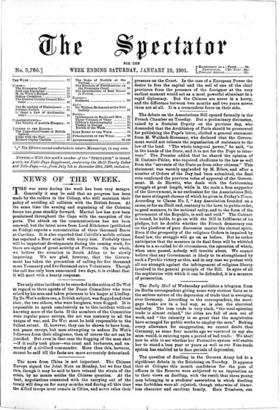The debate on the Associations Bill opened formally in the
French Chamber on Tuesday. But a preliminary discuasion, raised by a Socialist Deputy on the previous day, who demanded that the Archbishop of Paris should be prosecuted for publishing the Pope's letter, elicited a general statement from M. Waldeok-Rousseau, who declared that the Govern- ment would not tolerate the organisation of resistance to the law of the land. "The whole temporal power," he said, "is in the bands of the State, and it is not for the Pope to inter- vene." The Premier added that he shared the opinion of M. Casimir-Perier, who required obedience to the law as well from the "servants of the State as from other citizens." This statement was warmly applauded by M. Ribot, and after a number of Orders of the Day had been submitted, the final vote confirmed the previous votes of approval of the Govern- ment. M. de Blowitz, who deals with the forthcoming struggle at great length, while in the main a firm supporter of the Government, is no enthusiast for the Associations Bill, the more stringent clauses of which he gives inFriday's Times. According to Clause No. 2, "Any Association founded on a cause, or for an illicit end, contrary to the laws, to public order, to good manners, to the national unity, and to the form of the government of the Republic, is null and void." The Cabinet is bound, he holds, to go on with the Bill in fulfilment of its pledges, but he doubts whether the French democracy can on the platform of pure discussion master the clerical spirit. Even if the prosperity of the religious Orders is impaired by fiscal law, the struggle will go on as before. But he rather anticipates that the measure in its final form will be whittled down to a so-called loi de circonstance, the operation of which, when once passed, nobody will trouble about. We cannot believe that any Government is likely to be strengthened by such a Pyrrhic victory as this, and in any case we protest with all our strength against the infringement of religions liberty involved in the 'general principle of the Bill. In spite of all the sophistries with which it can be defended, it is a measure of persecution.






































